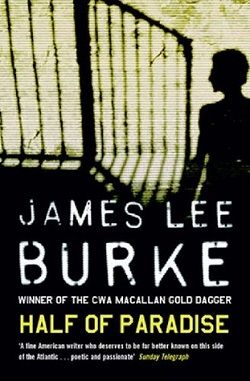Summary

Half of Paradise
by James Lee Burke
Toussaint Boudreaux, a black docker in New Orleans, puts up with his co-workers' racism because he has to, and moonlights as a prize-fighter in the hope of a better life-but the only break he gets lands him in penal servitude. J.P. Winfield, a hick with a gift for twelve-string guitar, finds his break into show-biz leads to the flipside of the American dream. Avery Broussard, descendant of an aristocratic French family, runs whiskey when what remains of his land is repossessed...
.
Read
Half of Paradise on http://kissnovel.net
Martial Peak Reviews
James Lee Burke's Half of Paradise is a poignant exploration of the American South, weaving together the lives of three men whose dreams are as varied as their backgrounds, yet all are ensnared in the harsh realities of life. Set against the backdrop of New Orleans, the novel delves into themes of race, aspiration, and the often brutal nature of existence, making it a compelling read that resonates with contemporary issues.
The narrative centers around three protagonists: Toussaint Boudreaux, J.P. Winfield, and Avery Broussard. Each character is meticulously crafted, embodying the struggles and aspirations of their respective social classes and backgrounds. Toussaint, a black docker, faces the relentless weight of racism while trying to carve out a better life for himself through prize-fighting. His journey is a testament to resilience, as he endures not only the prejudice of his co-workers but also the systemic barriers that confine him to a life of hardship. Burke's portrayal of Toussaint is both heartbreaking and inspiring, as he navigates a world that often seems determined to keep him down.
J.P. Winfield, on the other hand, is a white man from a rural background with dreams of musical stardom. His journey into the world of showbiz serves as a critique of the American dream, revealing the dark underbelly of fame and success. Burke's depiction of J.P. is layered; he is not merely a victim of circumstance but also a product of his environment, grappling with his own demons as he seeks validation through music. The contrast between J.P.'s aspirations and the reality he faces highlights the often illusory nature of success, a theme that Burke masterfully unpacks throughout the novel.
Avery Broussard, a descendant of an aristocratic French family, represents the crumbling legacy of the South. His descent into the world of whiskey running after losing his land is emblematic of the broader socio-economic changes that were sweeping through the region. Avery's character is steeped in nostalgia and loss, and Burke's evocative prose captures the essence of a man clinging to a past that is slipping away. Through Avery, Burke explores themes of identity and the struggle to maintain one's heritage in the face of relentless change.
Burke's writing is rich and lyrical, painting vivid images of the New Orleans landscape and its complex social fabric. His ability to evoke a sense of place is one of the novel's standout features; readers can almost feel the humidity of the air and hear the distant sounds of jazz permeating the streets. This immersive quality draws readers into the lives of the characters, making their struggles feel immediate and real.
One of the most striking aspects of Half of Paradise is its exploration of the intersectionality of race and class. Burke does not shy away from depicting the harsh realities faced by his characters, and through their stories, he sheds light on the systemic inequalities that persist in society. The novel serves as a microcosm of the broader American experience, illustrating how dreams can be both a source of hope and a catalyst for despair.
Character development is another area where Burke excels. Each protagonist undergoes a transformation that is both believable and impactful. Toussaint's journey from a hopeful docker to a man grappling with the consequences of his choices is particularly poignant. His experiences force him to confront not only the external challenges posed by society but also the internal conflicts that arise from his aspirations. Similarly, J.P. and Avery's arcs are intricately woven into the narrative, showcasing how their dreams are shaped and ultimately shattered by the world around them.
The novel's pacing is deliberate, allowing readers to fully engage with the characters and their struggles. Burke takes his time to develop the narrative, ensuring that each moment is imbued with significance. This slow burn approach may not appeal to all readers, but for those willing to invest the time, the payoff is profound. The emotional weight of the characters' journeys lingers long after the final page is turned, prompting reflection on the nature of dreams and the societal structures that shape them.
In comparison to other works that explore similar themes, such as Richard Wright's Native Son or Zora Neale Hurston's Their Eyes Were Watching God, Burke's novel stands out for its nuanced portrayal of the complexities of race and class in the South. While Wright's work is often more overtly political, Burke's approach is more subtle, allowing the characters' personal stories to illuminate the broader societal issues at play. This makes Half of Paradise a unique addition to the canon of Southern literature, offering a fresh perspective on familiar themes.
Overall, Half of Paradise is a masterfully crafted novel that delves deep into the human experience. Burke's ability to weave together the lives of his characters against the rich tapestry of New Orleans creates a narrative that is both engaging and thought-provoking. The themes of aspiration, identity, and the harsh realities of life resonate powerfully, making this book a must-read for anyone interested in the complexities of the American experience. Burke's work serves as a reminder that while dreams may drive us, it is often the world around us that dictates our fate.







![Baby Prisoner of the Winter Castle [Official]](/upload/pic/manga/baby-prisoner-of-the-winter-castle--official-.jpg)
















Reviews 0
Post a Reviews: